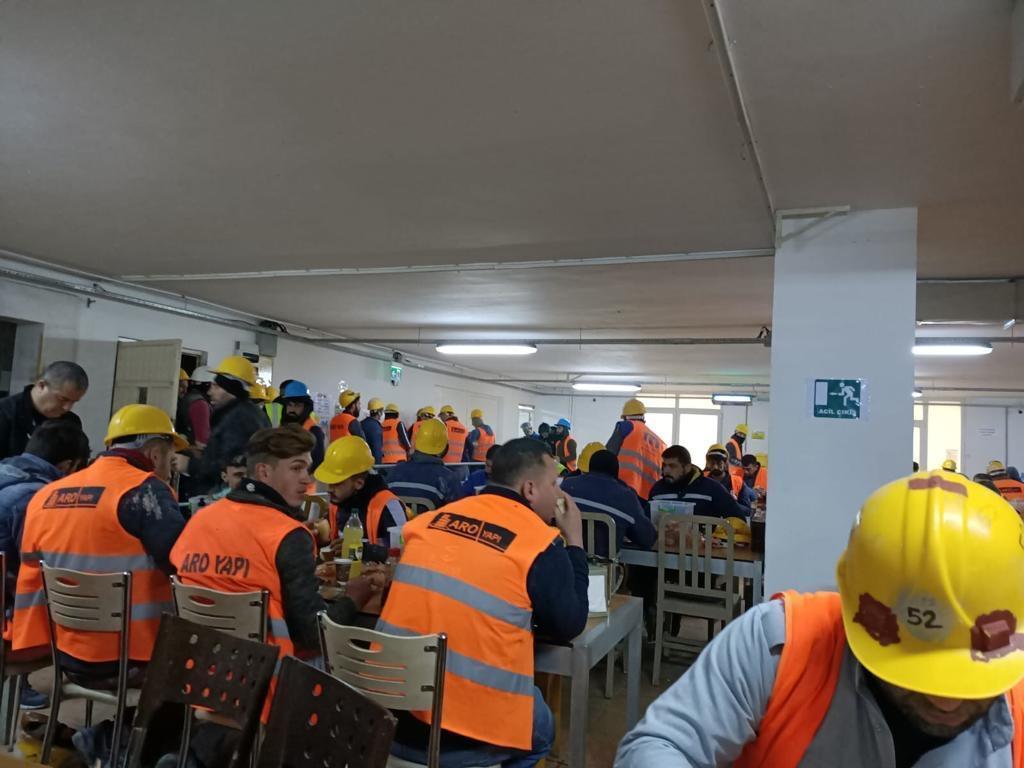In Turkey, only some lives are worth saving from coronavirus – others are collateral damage
President Erdogan is putting the lucrative construction industry before people's lives


Your support helps us to tell the story
From reproductive rights to climate change to Big Tech, The Independent is on the ground when the story is developing. Whether it's investigating the financials of Elon Musk's pro-Trump PAC or producing our latest documentary, 'The A Word', which shines a light on the American women fighting for reproductive rights, we know how important it is to parse out the facts from the messaging.
At such a critical moment in US history, we need reporters on the ground. Your donation allows us to keep sending journalists to speak to both sides of the story.
The Independent is trusted by Americans across the entire political spectrum. And unlike many other quality news outlets, we choose not to lock Americans out of our reporting and analysis with paywalls. We believe quality journalism should be available to everyone, paid for by those who can afford it.
Your support makes all the difference.In efforts to control the Covid-19 pandemic, Turkey first banned people older than 65 and younger than six from leaving their homes. The younger age limit was soon raised to 20, after images of home parties started circulating on social media. Then a long-anticipated lockdown arrived in 31 provinces, affecting more than 75 per cent of the population, but will apply only to weekends.
On Monday, the lockdown was lifted, and the country returned to the self-isolation and strict travel bans that have been in effect since mid-March, while most businesses remained shut.
For weeks, the motto “Home Has Life” has been flashing on our smartphones, replacing the names of mobile network providers, dominating TV screens to promote social isolation, while the health minister, at each of his press conferences, has repeated: “It is of the utmost importance that our 83 million population isolate itself much as possible. We strongly urge everyone not to leave their homes unless it’s an absolute necessity, and to use masks in public spaces.”
Yet despite the health minister’s call for the public to stay at home, the country’s president Recep Tayyip Erdogan has insisted that Turkey “is obliged to continue production and keeping the wheels turning under any circumstance.” What this means is that millions of people in the lower echelons of the workforce – builders, factory workers, cleaners, delivery people – do not have the luxury of self-isolation.
“We keep hearing officials call for people to stay at home, maintain social distance – none of which, obviously, applies to us,” said Yunus Ozgur, spokesperson of Insaat-Is, an independent construction workers’ labour union based in Istanbul. “Instead we are told to continue production. We have no other choice, anyway. Otherwise, we’d starve.”
There are at least 2 million construction workers in Turkey, mostly non-unionised, working on a part-time basis, paid under the table with limited social security benefits, at the mercy of patrons during a time when the sector is dominated by pro-government business groups.
Strict Covid-19 measures imposed by the health ministry on crowded workspaces were left largely on paper, just like many other regulatory measures, complained construction industry representatives I spoke with.
Dozens of videos and photos leaked on social media show workers in conditions prime for contagion – cramped cafeterias, shoulder-to-shoulder elevator rides, few wearing masks. These workers, of course, are risking not only their own lives, but hundreds of others as soon as they step offsite.
“Since the pandemic, no extra precautions have been taken for common areas: no extra cleaning, no sterilisation. And while a few sites adopted cross-seating at lunches, thermal cameras and reduced number of people in cabins, it is simply not enough,” said Ozgur Karabulut, a representative of DISK, Turkey’s third largest labour confederation.
“In line with the warnings of Turkey’s Science Council, we demanded all construction sites be shut for the time being, and workers sent home on paid leave. But instead, the government allocated equal sums of emergency funds for business patrons.”
In March, following the outbreak of the virus in Turkey, 15,000 construction workers were laid off by 750 companies in Istanbul, according to DISK research. At least seven sites where dozens were fired because they showed Covid-19 symptoms allowed business to continue as usual, Ozgur of Insaat-Is claims.
Such practices clearly violate Turkey’s labour laws and could be subject to heavy penalties, a labour ministry official told me on the phone, adding that their inspectors were working around the clock to attend to pandemic emergencies in all sectors. This work overload should not be mistaken for negligence, he said. The ministry was also working on a 19-point list of precautionary measures for construction sites to be published this week.
Yet in the meantime, the pandemic clock keeps ticking, and complaints flood labour unions.
Last week, well known construction firm Koray Insaat made its workers sign a disclaimer stating that, should they catch the virus, they would bear personal responsibility, workers I talked to explained. Those who refused to sign were threatened with being laid off without pay.
After the media published the news about the forced signing, the firm issued a statement denying the claims, and arguing that the form was not a disclaimer but a briefing.
Workers at the firm told me that the conditions at Koray Insaat sites put them at risk of catching the virus. “Even after the pandemic arrived in Turkey, we had lunch in a tiny cafeteria where the employees of another firm ate. The tables were never cleaned. A hundred of us used 10 toilets, and I was never lucky enough to use it clean first thing in the morning,” said Ahmet*, 21, one of the workers who was forced to sign the form and left work after pressure to stick to the government’s recommendations.
His firm, Ahmet said, took a highly selective approach to preventative measures. “I heard that the health inspectors, who never showed up during the three months I was there, came after the news reports. Suddenly, everywhere was spotless; the few sterilisers that we shared multiplied in every corner.”
The construction sector is the pillar of Erdogan’s financial legacy since he came to power in 2003 and, even during the pandemic, is a considerable source of cash in the $750bn economy.
In the economy’s current state, the government’s critics say it would be hard-pressed to put the brakes on any line of production, and instead may consider deaths among this low-paid group to be “collateral damage”.
“What is the urgency of finishing up a hotel complex, a residential compound or Istanbul’s cultural centre when there will not be any tourism for many months?” Karabulut rightly asked. “We will campaign to have sites affected by the pandemic closed – it’s the only card left in our hand.”
Construction workers share similar fates in almost every country, no matter how robust their economies are. In Spain, workers of non-essential projects like the new Real Madrid stadium were only asked to stay home after the country lost 5,690 lives to the pandemic.
Turkey, which has seen 1,296 deaths from coronavirus at the time of writing, shows no sign of including these overlooked, underpaid and often ill-treated workers in its “Home Has Life” campaign.
Ahmet can now afford self-isolation in his hometown on his last wage of 3,200 Turkish lira (£385), though only for a few more weeks. “My father doesn’t work, my brother has his own family to take care of,” he said. “I don’t have the luxury of staying home or choosing which site I work on – I will have to work when work comes along.”
*Ahmet is a pseudonym
Join our commenting forum
Join thought-provoking conversations, follow other Independent readers and see their replies
Comments